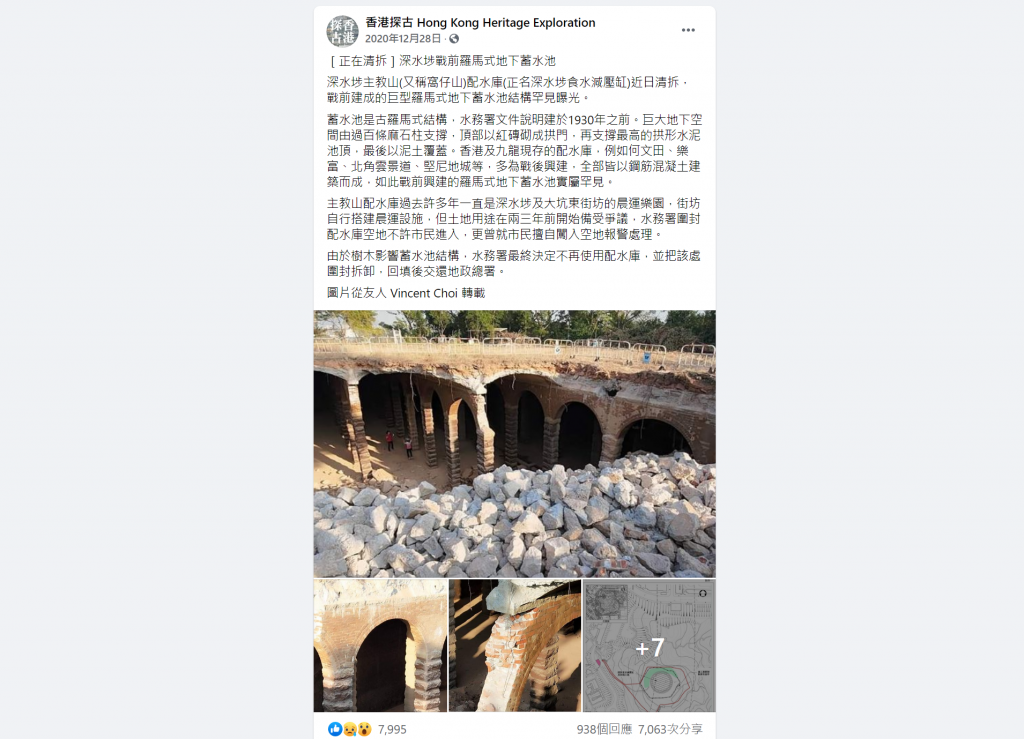“Comment, Like, and Share!” – The Boom of Hong Kong’s History Pages
(Part 2: Challenges and Opportunities)
by
Reynold Tsang
(DPhil student, University of Oxford)
In mid-March 2021, a small “scandal” erupted in the public history circle of Hong Kong. Earlier that month, a new “Hong Kong history” page is established. The admin of that new history page is an employee of a pro-government research centre, which happens to run an apparent “blue” (pro-government) history page. The identity of this admin was soon discovered by some “yellow” (pro-democracy) history pages. These “yellow pages” are highly suspicious of the admin’s motive and warned their readers about that. They worry that the new history page would disguise as a “neutral” page and carry out missions assigned by the pro-government research centre, such as instilling the official historical narrative and framing public opinions in favour of the government. After the exposure, the admin of the new history page did not deny nor admit their pro-government stance. In response to suspicion, their criticised the “yellow pages” for making baseless accusations and judging the page for its political stance instead of contents. The second point is indeed worth considering, should we judge a history page based on its objectives and ideology? Nevertheless, one “yellow page” also makes a good point – public historians should defend the genuineness of history and, more importantly, uphold the values and morals of society. This humanistic approach coincides with the proposition of some liberal historians that historians should assist the pursuit of social justice and call out oppression.
The above incident reflects the complication of running history pages in Hong Kong. If you have no idea what a history page is, please check out Part 1 of this blogpost and the “History Pages, Channels, and Websites in Hong Kong” list. In Part 2, I will share my observations and thoughts on the present situation and future of history pages. My discussion will focus on the “Hong Kong history” pages.
Challenges
Politics first! I guess this is more a concern than a challenge. As shown above, history pages could not escape from the political polarisation of Hong Kong society. But like I mentioned in Part 1, it is natural for historians (professional or amateur) to present their opinions and make arguments. However, some history pages went to the extreme and asserted very biased viewpoints to support their political stance. For example, a “blue page” recently provided an “alternative perspective” on the June Fourth Incident. It claimed that the Tiananmen protesters burnt down “few hundreds” of armoured cars and snatched some of them to attack the army, killing a lot of soldiers. Meanwhile, it mentioned nothing about the army crackdown on protestors. What the page claimed might be true to some extent, discounting the exaggeration, but it deliberately ignored all evidence against its standpoint and completely failed to present the general situation (not to mention the full one). On the other hand, a few “yellow pages” occasionally romanticised British colonial rule over Hong Kong in the nineteenth and the early twentieth centuries, when racial discrimination and corruption were grave. Nonetheless, I think it is pointless for history pages to completely ignore politics and even ban political comments (as suggested by some “apolitical” readers) because history and politics are inseparable. But history pages should refrain from becoming political commentators.
Back to the question of whether we should judge a history page based on its political stance. I think it is not fair to denounce a history page if its contents are accurate and reasonable. But readers should always bear in mind the political stance and background of a history page, as they inevitably affect the page’s narrative, such as the choice of topics and use of words. Anyway, I appreciate history pages embracing a humanistic spirit.
Money, Money, Money. Funding is a major problem for both historians and history pages. Except those with affiliation, most history pages are self-funded, and most admins cannot afford to run their pages full-time. In theory, operating a history page does not involve much expense, but those willing and able to pay will have an advantage. In fact, there is a financial imbalance between the so-called “blue pages” and other pages. The former are well funded by their parent organisations. Most of them employ a team of full-time admins and editors to manage their pages and place advertisements on social media (aka buying reach rates). Their financial strength explains why some “yellow pages” are so anxious about the expansion of “blue pages”, as it would not be a fair competition. In the meantime, some self-funded history pages explore new funding options, such as crowdfunding and membership subscription. For example, more and more pages turn to Patreon (a membership platform) these days. However, making some contents exclusive to paid members might deter new followers and curtail their reach on social media.
The new situation under the National Security Law. I think this point does not need much explanation. Some history pages probably have a hard time navigating in the new situation. Furthermore, self-censorship will likely be more pervasive. Anyway, this new situation may also be an opportunity for some history pages.
Quality control. Unlike academic publications, there is no peer review for history posts on social media. In addition, some admins and editors of history pages are not history graduates and receive no training in writing history.[1] So, the quality of history pages varies considerably, with some reaching the level of academic studies and some getting basic historical facts wrong. In order to react quickly to hot topics on the internet, some history pages (especially the KOLs) would sacrifice quality for speed and deliver somewhat hollow or inaccurate contents.[2] I hope history pages can crosscheck their information even when posting in haste.
Staying active! Although the number of history pages increased significantly in the past few years, not every page survives. Some notable defunct pages include Decoding Hong Kong’s History (by Liber Research Community and Demosisto), Hong Kong Chronicle, Cemetery Study, and Hong Kong’s First (English website and discussion forum). These pages stopped operating for different reasons, such as the death or departure of the chief admin and the disbandment of the parent organization. Constantly updating and coming up with new contents is undoubtedly hard work, especially pages managed by one or two people.
Opportunities
Bridging academia and the public. The latest academic studies and findings, especially for humanities subjects, often take ages to reach the public. Sometimes I encounter the awkward situation of people asking me why no one studies a certain historical topic, even if that topic is quite well-researched. I see the potential of history pages in narrowing the gap between academia and the public (at least the netizens). In fact, a few history pages are already doing that, such as the Hong Kong History Project. It has done an excellent job in introducing young historians and history postgraduates on Hong Kong history and their current research. I look forward to seeing more history pages introducing, summarising, and explaining the latest research projects and academic studies.
Advanced research. Apart from sharing and condensing academic studies, some history pages are capable of conducting advanced research of their own. As mentioned earlier, a few history pages can produce contents comparable to academic studies. Their use of sources astonished me particularly. Other than basic primary sources like photos and newspapers, they also reference various archival materials, such as correspondence, minutes, maps, and statistics. Some even provide a bibliography at the end of their posts. I would encourage history pages to conduct more advanced research, as I see the demand for more in-depth contents among readers. Anyway, it is not a “must”. Many readers (including me) still enjoy reading historical anecdotes and trivia.
Power in unity. In the previous year, there are more and more exchanges and collaboration between different history pages, ranging from sharing each other’s posts to doing a live discussion together. The power of history pages united is best reflected in the campaign to stop the demolishment of Ex-Sham Shui Po Service Reservoir in late December 2020. Hong Kong Heritage Exploration was the first to post about the demolishment of the underground reservoir. Its post and photos soon spread like wildfire on the internet, thanks to the “sharing” of multiple history pages and their followers. Later that day, around twenty history pages signed a joint statement to petition for the conservation of the underground reservoir. The united effort of history pages (including different research on the history of the reservoir), coupled with the help of various public figures and individuals, successfully forced the government to stop the demolishment and conserve the reservoir instead. We should not underestimate the influence of history pages working together. I hope there will be more cooperation and crossover between pages. Perhaps an alliance? Or a discussion forum (there are several Hong Kong history forums for Chinese readers on Facebook, but their discussion quality and standing could not compare with their English counterparts)?
The above are just my personal opinions. Please do not see them as guidelines or criticism. I hope history pages with different political stance and from different background can thrive together, as there shouldn’t be just one single “correct” narrative. Some can argue there was more good than harm and some can argue there was more harm than good, as long as the argument is supported by evidence. Last but not least, I would like to thank all history pages for promoting history, especially Hong Kong history, and making history fun.
[1] Please note that a history degree does not guarantee good history posts and a person with no history background does not necessarily produce bad history posts.
[2] I did not count Key Opinion Leaders (KOLs) as pages in this blogpost, but many KOLs in politics would talk about history, and a few of them would discuss history regularly.








![Researching my Hong Kong family’s past: A fourteen-year quest [Part 3]](https://www.hkhistory.net/files/2019/07/IMG_4941-e1563874954902-150x150.jpg)